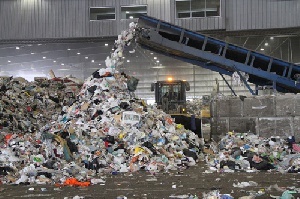The Council for Scientific and Industrial Research (CSIR) is calling on government to consider using waste-to-energy technology in its quest to maintain the environment and protect it from climate change.
A Research Scientist with the CSIR, Dr. Mutala Mohammed, made this call when some selected stakeholders – including representatives from the Ministry of Environment Technology and Innovation (MESTI), Energy Ministry, Sanitation Ministry, Local Government Ministry and some industry players – paid a visit to the Gyankobaa Waste to Energy (W2E) Project site in the Atwima Nwabiagya municipality of Ashanti Region.
The visit was to afford stakeholders first-hand information as to progress of the facility, which was set up some two years ago with support from the German government as a pilot project. 5
This will segue them to a two-day workshop on the way forward for this cutting-edge technology.
Speaking in an interview with journalists after the facility tour, Dr. Mutala Mohammed – who has been an integral partner since its inception – highlighted some benefits to be accrued when adopted by government and other West African countries.
“This is the system that every government should be interested in, because we know waste has always been a big challenge and we see a lot of flooding in our communities – and that has to do with the way we manage our waste system in these communities. With systems like this, you are not actually dealing with the waste situation only; in addition, you are getting some sort of product/s from it.
To emphasise even more, it is not only the gas you are generating; there is also an additional by-product, which is the compost you can get from processing the waste – and that can go into agriculture. We know inorganic waste fertilisers are now becoming very expensive and there has been a lot of advocacy and support going to organic feritliser use,” he said.
For his part, Regional Coordinator-Renewable Energy, West African Science Service Centre on Climate Change and Adapted Land Use (WASCAL), Dr. Bruno Korgo told journalists that this project comes with several opportunities – as the amount of waste deposited and treated at the facility, it is helping to protect the environment, produce energy and generate employment.
“Looking at the volumes of waste deposited here daily, you see the role this project is playing in terms of treatment for sanitation and protecting the environment. Moreover, the energy it produces can be used for local populations and also to run the facility,” Dr. Korgo said.
He further noted that it is now time to progress as the project’s funders – the Federal Ministry of Education and Research (BMBF) Germany – will leave in the future. Hence, there is a need to find alternative ways of sustaining the project and also replicating it in other parts of the country and West Africa at large.
“You can see that all the units are done. The next step will be to find a model that will run this plant, looking at maybe any private or public company which s to join the project and run it in a sustainable manner – so then we have a business model that works and can be replicated everywhere.
“The next phase of the project will be the funders exit and other stakeholders take over and run it in a sustainable manner – so it works and delivers the services it is supposed to; that is sanitation, energy production and a lot of various technologies for waste recovery,” he added.
Business News of Wednesday, 2 October 2024
Source: thebftonline.com
Waste-to-energy is the way to go – CSIR
Entertainment












